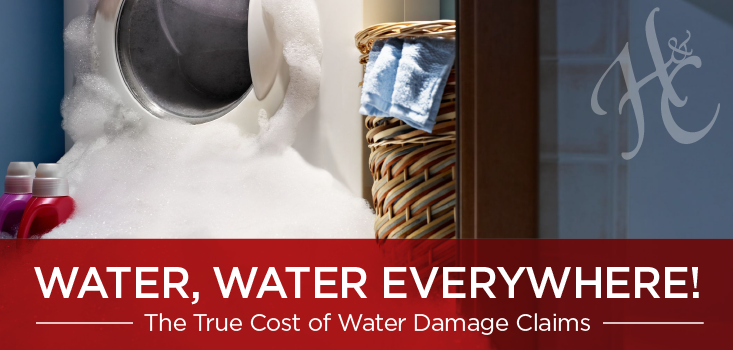We often think of Mother Nature as the most likely source of damage to our homes, but we shouldn’t be ignoring likely culprits inside our homes either, like an ice machine hose or washing machine. Non-weather-related water damage claims are one of the most common types of claims on a home, second only to exterior wind damage. We took a look at the true cost of water damage claims, and best practices for determining what’s covered and what isn’t.
Types of Water Damage
The International Risk Management Institute (IRMI) classifies three different types of water damages:
- Roof: A damaged roof which results in water damage to the ceiling and personal property below the ceiling.
- Plumbing: A burst or leaking pipe or line, or a back up or overflow of plumbing basins.
- Flooding: A natural disaster not covered under normal homeowner policies.
The Cost of Water Damage
Water damage claims from pipe and appliance failures are one of the most common types of losses. In 2014, the Insurance Information Institute (III) found 34% of losses were due to water damage and pipe freezing. According to DisasterSafety.org, the average loss due to a corroded, leaky, or improperly installed pipe is $4,300. A water heater failure averages $4,444 per incident after the deductible is met. With the frequency and cost of these claims, it’s important to understand exactly what to look for when you’re evaluating them.
Tips and Best Practices for Water Damage Claims
The Insurance Information Institute offers this rule of thumb for water damage claims:
“Generally speaking, water that comes from the top down, such as rainfall, is covered by a standard homeowners insurance policy, while water that comes from the bottom up, such as an overflowing river, is covered by a separate flood insurance policy.”
Here are a few specific tips and best practices to keep in mind:
-
When evaluating a claim, quickly establish if the cause was a mechanical failure or maintenance failure by determining if the event happened suddenly and accidentally. A failed ice machine hose would be considered sudden and accidental, but damage from a leaky or corroded pipe would not be.
According to the precedent set by Wheeler v. Allstate Ins. Co., as outlined in Claims Journal, an event may start as sudden and accidental, but if it is ignored or allowed to continue the resulting damage is not sudden and accidental, and therefore, may not be covered.
-
Most insurance companies require an additional rider for water damage from back up of a sewer or drain to be covered. This includes seepage from the ground into a basement.
-
It’s important for policyholders to understand that most policies do not cover the source of the water damage. For example, a policy would cover the cost of repairing flooring from a malfunctioning dishwasher, but won’t pay for the dishwasher itself to be replaced.
-
Resolving water damage claims swiftly is very important, not only for customer satisfaction, but because of the high risk of mold with these claims. If mold is the direct result of an event such as a burst pipe, the clean up could lead to an even more costly claim.
Water Damage Prevention
While you can’t prevent all water damage events, policyholders should be encouraged to take simple steps to maintain their plumbing and prevent a claim. For example, encourage policyholders to annually inspect all hoses and faucets and replace those with cracks and leaks. To prevent pipes from bursting, install an emergency pressure release valve. Policyholders should also frequently check gutters and downspouts for debris and install gutter guards to prevent clogs.

